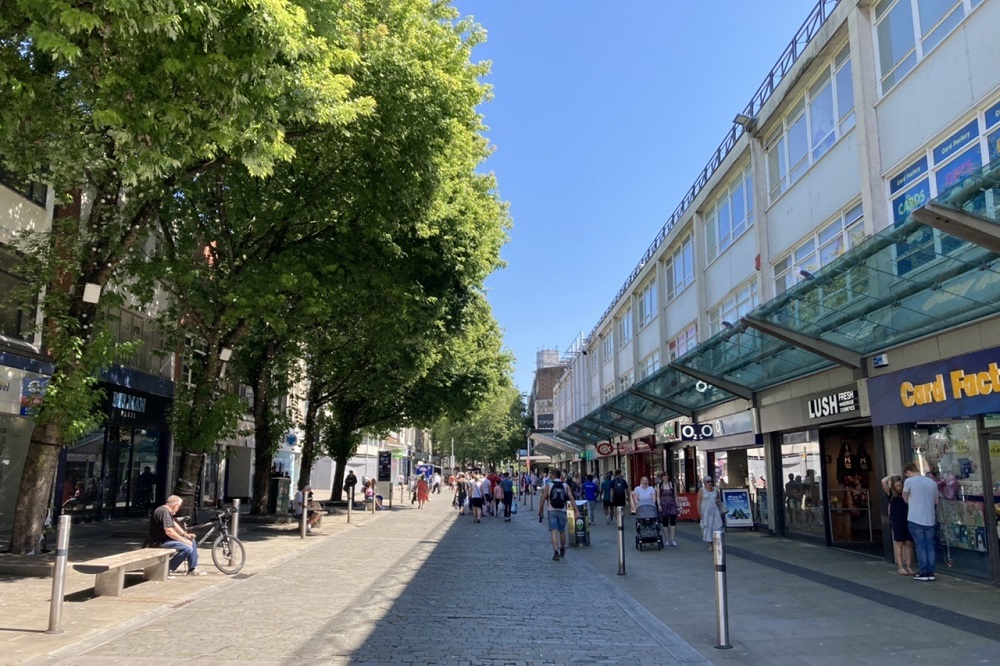Born in a barn? Should shop doors be closed during heatwaves?

Richard Youle, local democracy reporter
It’s late morning in the centre of Swansea on another baking summer’s day, and shoppers are merrily nipping in and out of shops, cafes and bakeries.
People seem relaxed and I overhear a few more laughs and “ta-ra babes” than normal.
The nipping in and out bit of shops is especially easy these days as the majority of doors are constantly open. But is that a good idea when many shops have air conditioning, energy costs are soaring, and wasting electricity isn’t exactly a win-win for the environment?
Two weeks ago it was reported that shops in France, which has experienced extreme temperatures, drought and wildfires this summer, will be fined up to £640 for keeping their doors open when their air conditioning was on. The same applies for heating.
Agnes Pannier-Runacher, France’s minister for ecological transition, said leaving doors open with air conditioning on led to 20% more energy consumption, and was “absurd”.

Access
France has been hotter than Swansea in recent weeks, but I’m still struck by the change in temperature when I walk in off the street to shops with air conditioning.
It’s the reverse in winter. But would you have your central heating on at home with the front door open?
I walk along Whitewalls, on the Swansea Market side of the road, around the corner and along Oxford Street, and then left on Union Street.
I count 24 premises, and 22 of them have their doors open, although one has just one out of two doors open. They include bakeries with open chillers a few feet inside.
One of those with closed doors is the Yorkshire Building Society, on Union Street, but customers are inside and business goes on.
During my walk, shop staff tell me that open doors were more welcoming, and in some cases their design didn’t allow for constant opening and closing.
I also think to myself that people with disabilities must be able to access premises the same as able-bodied.
Megan James, supervisor at cosmetics retailer Lush on Oxford Street, said it had an open door policy and that she understood the company, which has a strong ethical bent, sourced its electricity from renewable providers.
“We do tend to keep the air con off as much as possible,” she said. “We’ll have it on for an hour and then turn it off again. Also, we’ve got large sliding doors which are quite difficult to open and close.”
Closed door
A member of staff at Gifts & Co, on Union Street, said the store’s open doors were a “safety and design thing”, and that the air conditioning wasn’t currently on as the system needed servicing.
She added: “In the winter time when we’ve got the heating on, it just goes out through the door.”
I notice the entrance doors to Swansea Market and Quadrant Shopping Centre are open, and then wander up Portland Street and through the open door of The Gower Butcher, where manager Alan Hopkins perhaps hits the nail on the head.
“People will not come in through a closed door,” he said. “We’ve always found that. They stand outside saying, ‘Are you open?’ It’s that perception that if the door is closed, they think we are closed.”
Leaving the air-conditioned butchers, I double back onto Oxford Street and pass clothing retailer H&M, whose automatic door opens and closes as customers approach.
It has a green sign saying it was open and that it kept the doors closed to save energy. This seems a simple, forward-thinking approach, and I wonder if other commercial premises could replicate it.

Net zero
I asked the British Retail Consortium (BRC), a trade association, if shop doors ought to be closed when air conditioning was on and when, in winter, the heating was on.
In response, Sara Jones, head of the Welsh Retail Consortium, said leading retailers were signed up to the BRC’s climate roadmap to go “net zero” by 2040.
“The first part of the roadmap to be delivered is ensuring net zero buildings and warehouses by 2030,” she said.
“So retailers are working hard to reduce the energy use of their buildings while also giving customers the best possible shopping environment.”
I’m sure I remember opening and closing shop doors as a youngster.
The “open” or “closed” sign on the door was usually a good clue.
Support our Nation today
For the price of a cup of coffee a month you can help us create an independent, not-for-profit, national news service for the people of Wales, by the people of Wales.






It makes sense, both environmentally and comfort-wise, to have the doors shut.
{I’m sure I remember opening and closing shop doors as a youngster.
The “open” or “closed” sign on the door was usually a good clue.} Are people still capable of reading!
I can’t honestly say this is a topic needing discussion. Does keeping doors closed use less energy? Yes? Then close the doors. Anyone who has “strong opinions” on it is free to “boycott” the store. Problem solved. Next problem please.